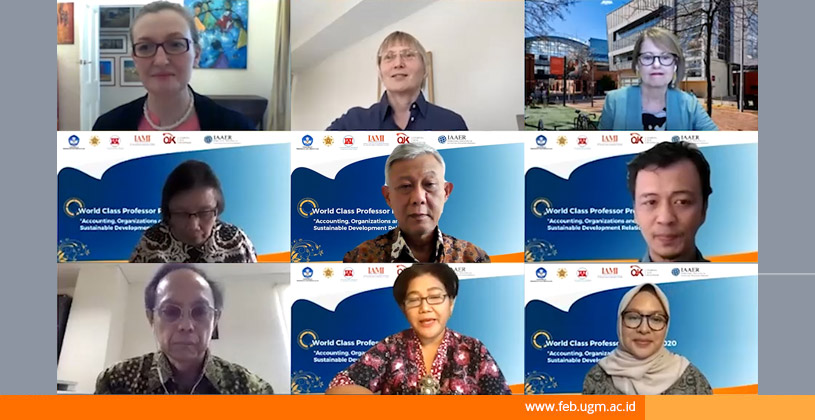Accounting, Organizations, and Sustainable Development Relationship
- Details
- Written by FEB UGM
- Category: News
- Hits: 1278

The 4th World Class Professor (WCP) Program 2020 was successfully held online on (13/11/2020) with the theme "Accounting, Organizations, and Sustainable Development Relationship". The series of WCP Program 2020 was held with the aim that lecturers or researchers in Indonesia can improve and develop their academic life, competence, as well as their contribution to the advancement of national science and technology. This webinar program from the Ministry of Education and Culture (Kemendikbud) also invites world-class professors from world's leading universities and institutions to become insightful speakers of this event.
Like the previous webinars of WCP series, the fourth WCP Program 2020 is divided into two parts, namely an international perspective session and an Indonesian perspective session. The international perspective session started the webinar. In this panel discussion, Prof. Keryn Chalmers, President of IAAER and Dean of the Swinburne Business School, Swinburne University of Technology, served as the moderator.
Being the first speaker, Prof. Fabienne Michaux, a Finance and Rating Expert at the United Nations Development Program (UNDP), discussed a topic about catalyzing investment to achieve the Sustainable Development Goals (SDGs). Prof. Michaux said that the SDG Impact (consisting of impact management, intelligence, and facilitation) makes it easier to develop and identify investments that contribute to achieving the SDGs. In addition, focusing on impact management, UNDP developed the SDGs Impact Standard which acts as a driver of change across the whole system by leveraging UNDP's unique role.
The panel discussion session continued with a discussion on sustainability reporting around SDGs and value creation delivered by Prof. Carol Adams, a professor of accounting at Swinburne Business School and Durham University Business School. In her presentation, Prof. Adams describes several examples of standards or frameworks that have formed a basis for adopting SDGD Recommendations such as the International (IR) Framework and the GRI Standards. She also emphasized that organizations need to think about strategies for doing business differently and also need board members who understand sustainability issues to really make the change happen.
The next session was the Indonesian perspective session guided by Dr. Singgih Wijayana, M.Sc., lecturer at the Faculty of Economics and Business UGM who also serves as a member of DSAK IAI, as the moderator. The first speaker in this session was Dr. Elvia Rosantina Shauki, M.B.A., Ak., CA., lecturer at the Department of Accounting, Faculty of Economics and Business, University of Indonesia, who is also a member of DSAK IAI. She discussed the progress towards comprehensive reporting and insight into the future of non-financial reporting. In her presentation. Dr. Elvia said that there are five frameworks and standard-setting institutions of international significance that have co-published a shared vision of the elements necessary for more comprehensive corporate reporting as well as a joint statement of intent to drive towards this goal.
Then, the webinar event continued with the last speaker session, Drs. Nur Sigit Warsidi, Ak., M.B.A., Head of the Capital Market Supervision Department of the Financial Services Authority (OJK) and Member of the Indonesian Public Accountant Professional Committee (KPAP). Drs. Nur Sigit shared about the topic of integrated reporting in this session. Based on his presentation, there are six basic principles in the application of integrated reporting in Indonesia, namely focus and future strategies, information connectivity, stakeholder relations, materiality, conciseness, and reliability and completeness. Besides that, according to Drs. Nur Sigit, the implementation of integrated reporting has been accommodated in the implementation of the annual report and sustainability report. A sustainability report is a report that is announced to the public which contains economic, financial, social and environmental performance. The fourth WCP Program 2020 webinar series was ended by a question and answer session from participants and answered by the speakers at the discussion panel.
Reportage: Kirana Lalita Pristy/Sony Budiarso


